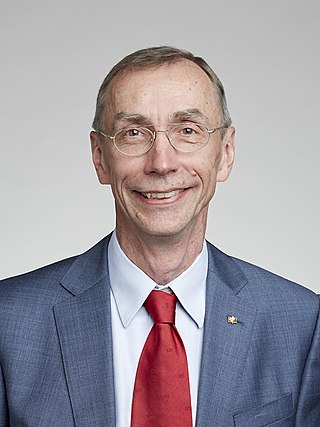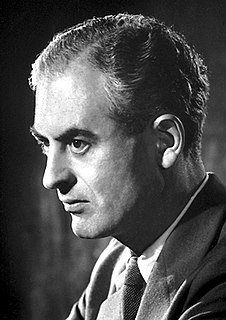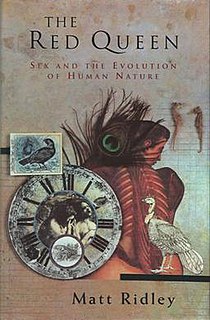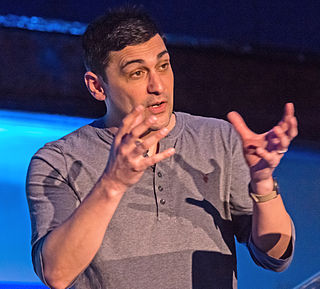
John Maynard Smith was a British theoretical and mathematical evolutionary biologist and geneticist. Originally an aeronautical engineer during the Second World War, he took a second degree in genetics under the well-known biologist J. B. S. Haldane. Maynard Smith was instrumental in the application of game theory to evolution with George R. Price, and theorised on other problems such as the evolution of sex and signalling theory.

Theodosius Grigorovich Dobzhansky was a prominent Ukrainian-American geneticist and evolutionary biologist, and a central figure in the field of evolutionary biology for his work in shaping the modern synthesis. Dobzhansky was born in Nemirov, in the Russian Empire and emigrated to the United States in 1927, aged 27. A great-grandson of the Russian writer Feodor Dostoevsky.

Thomas Hunt Morgan was an American evolutionary biologist, geneticist, embryologist, and science author who won the Nobel Prize in Physiology or Medicine in 1933 for discoveries elucidating the role that the chromosome plays in heredity.
Milford Howell Wolpoff is a paleoanthropologist and professor of anthropology at the University of Michigan and its museum of Anthropology. He is the leading proponent of the multiregional evolution hypothesis that explains the evolution of Homo sapiens as a consequence of evolutionary processes and gene flow across continents within a single species. Wolpoff authored the widely-used textbook Paleoanthropology, and co-authored Race and Human Evolution: A Fatal Attraction, which reviews the scientific evidence and conflicting theories about the interpretation of human evolution, and biological anthropology's relationship to views about race.

Svante Pääbo is a Swedish geneticist who specialises in the field of evolutionary genetics. As one of the founders of paleogenetics, he has worked extensively on the Neanderthal genome. In 1997, he became founding director of the Department of Genetics at the Max Planck Institute for Evolutionary Anthropology in Leipzig, Germany. Since 1999, he has been an honorary professor at Leipzig University; he currently teaches molecular evolutionary biology at the university. He is also an adjunct professor at Okinawa Institute of Science and Technology, Japan.

Jared Mason Diamond is an American geographer, historian, ornithologist, and author best known for his popular science books The Third Chimpanzee (1991); Guns, Germs, and Steel ; Collapse (2005), The World Until Yesterday (2012), and Upheaval (2019). Originally trained in biochemistry and physiology, Diamond is known for drawing from a variety of fields, including anthropology, ecology, geography, and evolutionary biology. He is a professor of geography at UCLA.

Luigi Luca Cavalli-Sforza was an Italian geneticist. He was a population geneticist who taught at the University of Parma, the University of Pavia and then at Stanford University.

Sir Peter Brian Medawar was a Brazilian-British biologist and writer, whose works on graft rejection and the discovery of acquired immune tolerance were fundamental to the medical practice of tissue and organ transplants. For his scientific works he is regarded as the "father of transplantation". He is remembered for his wit both in person and in popular writings. Famous zoologists such as Richard Dawkins referred to him as "the wittiest of all scientific writers", and Stephen Jay Gould as "the cleverest man I have ever known".

John Stephen Jones is a British geneticist and from 1995 to 1999 and 2008 to June 2010 was Head of the Department of Genetics, Evolution and Environment at University College London. His studies are conducted in the Galton Laboratory. He is also a television presenter and a prize-winning author on the subject of biology, especially evolution. He is a popular contemporary writer on evolution. In 1996 his work won him the Michael Faraday Prize "for his numerous, wide ranging contributions to the public understanding of science in areas such as human evolution and variation, race, sex, inherited disease and genetic manipulation through his many broadcasts on radio and television, his lectures, popular science books, and his once-regular science column in The Daily Telegraph and contributions to other newspaper media".
Richard Charles Lewontin was an American evolutionary biologist, mathematician, geneticist, and social commentator. A leader in developing the mathematical basis of population genetics and evolutionary theory, he pioneered the application of techniques from molecular biology, such as gel electrophoresis, to questions of genetic variation and evolution.

Sydney Brenner was a South African biologist. In 2002, he shared the Nobel Prize in Physiology or Medicine with H. Robert Horvitz and Sir John E. Sulston. Brenner made significant contributions to work on the genetic code, and other areas of molecular biology while working in the Medical Research Council (MRC) Laboratory of Molecular Biology in Cambridge, England. He established the roundworm Caenorhabditis elegans as a model organism for the investigation of developmental biology, and founded the Molecular Sciences Institute in Berkeley, California, United States.

Jacques Lucien Monod was a French biochemist who won the Nobel Prize in Physiology or Medicine in 1965, sharing it with François Jacob and André Lwoff "for their discoveries concerning genetic control of enzyme and virus synthesis".
Steven Peter Russell Rose is an English neuroscientist, author, and social commentator. He is emeritus professor of biology and neurobiology at the Open University and Gresham College, London.
Robert James "Sam" Berry was a British geneticist, naturalist and Christian theorist. He was professor of genetics at University College London between 1974 and 2000. Before that he was a lecturer in genetics at The Royal Free Hospital School of Medicine in London. He was president from 1983 to 1986 of the Linnean Society, the British Ecological Society and the European Ecological Federation. As a Christian, Berry spoke out in favour of theistic evolution, served as a lay member of the Church of England's General Synod and as president of Christians in Science. He was a member of the Board of Governors of Monkton Combe School from 1979 to 1991. He gave the 1997–98 Glasgow Gifford Lectures entitled Gods, Genes, Greens and Everything. His father, A.J.Berry, died in 1947.
Armand Marie Leroi is a New Zealand-born Dutch author, broadcaster, and professor of evolutionary developmental biology at Imperial College in London. He received the Guardian First Book Award in 2004 for his book Mutants: On Genetic Variety and the Human Body. He has presented scientific documentaries on Channel 4 such as Alien Worlds (2005) and What Makes Us Human (2006), and BBC Four such as What Darwin Didn't Know (2009), Aristotle's Lagoon (2010), and Secret Science of Pop (2012).

Jack William Szostak is a Canadian American biologist of Polish British descent, Nobel Prize laureate, university professor at the University of Chicago, former Professor of Genetics at Harvard Medical School, and Alexander Rich Distinguished Investigator at Massachusetts General Hospital, Boston. Szostak has made significant contributions to the field of genetics. His achievement helped scientists to map the location of genes in mammals and to develop techniques for manipulating genes. His research findings in this area are also instrumental to the Human Genome Project. He was awarded the 2009 Nobel Prize for Physiology or Medicine, along with Elizabeth Blackburn and Carol W. Greider, for the discovery of how chromosomes are protected by telomeres.

The Red Queen: Sex and the Evolution of Human Nature is a popular science book by Matt Ridley exploring the evolutionary psychology of sexual selection. The Red Queen was one of seven books shortlisted for the 1994 Rhône-Poulenc Prize, that was eventually won by Steve Jones' The Language of the Genes. The title is in reference to the Red Queen hypothesis in evolutionary biology.
Kim Sterelny is an Australian philosopher and professor of philosophy in the Research School of Social Sciences at Australian National University and Victoria University of Wellington. He is the winner of several international prizes in the philosophy of science, and was previously editor of Biology and Philosophy. He is also a member of the Australian Academy of the Humanities. He is currently the First Vice President of the Division for Logic, Methodology and Philosophy of Science and Technology of the International Union of History and Philosophy of Science and Technology (2020–2023).

John Roger Speakman is a British biologist working at the University of Aberdeen, Institute of Biological and Environmental Sciences, for which he was Director from 2007 to 2011. He leads the University's Energetics Research Group, which is one of the world's leading groups using doubly labeled water (DLW) to investigate energy expenditure and balance in animals. Between 2011-2020, he was a '1000 talents' Professor at the Institute of Genetics and Developmental Biology, Chinese Academy of Sciences, in Beijing, China, where he ran the molecular energetics group. In 2020 he moved to the Shenzhen Institutes of Advanced Technology, Chinese Academy of Sciences in Shenzhen, China where he works at the Center for Energy Metabolism and Reproduction and Head of the Shenzhen Key laboratory of Metabolic Health.

Adam David Rutherford is a British geneticist and science populariser. He was an audio-visual content editor for the journal Nature for a decade, and is a frequent contributor to the newspaper The Guardian. He hosts the BBC Radio 4 programmes Inside Science and The Curious Cases of Rutherford and Fry; has produced several science documentaries; and has published books related to genetics and the origin of life.














